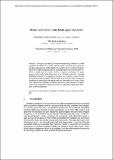Modeling Infection with Multi-agent Dynamics
Author(s)
Dong, Wen; Heller, Katherine; Pentland, Alex Paul
DownloadPentland_Modeling infections.pdf (346.4Kb)
OPEN_ACCESS_POLICY
Open Access Policy
Creative Commons Attribution-Noncommercial-Share Alike
Terms of use
Metadata
Show full item recordAbstract
Developing the ability to comprehensively study infections in small populations enables us to improve epidemic models and better advise individuals about potential risks to their health. We currently have a limited understanding of how infections spread within a small population because it has been difficult to closely track and infection within a complete community. This paper presents data closely tracking the spread of an infection centered on a student dormitory, collected by leveraging the residents’ use of cellular phones. This data is based on daily symptom surveys taken over a period of four months and proximity tracking through cellular phones. We demonstrate that using a Bayesian, discrete-time multi-agent model of infection to model the real-world symptom report and proximity tracking records can give us important insights about infections in small populations
Date issued
2012Department
Massachusetts Institute of Technology. Department of Brain and Cognitive Sciences; Massachusetts Institute of Technology. Media LaboratoryJournal
Social Computing, Behavioral - Cultural Modeling and Prediction
Publisher
Springer Berlin Heidelberg
Citation
Dong, Wen, Katherine Heller, and Alex Pentland. “Modeling Infection with Multi-agent Dynamics.” Social Computing, Behavioral - Cultural Modeling and Prediction. Ed. Shanchieh Jay Yang, Ariel M. Greenberg, & Mica Endsley. Vol. 7227. Berlin, Heidelberg: Springer Berlin Heidelberg, 2012. 172–179.
Version: Author's final manuscript
ISBN
978-3-642-29046-6
978-3-642-29047-3
ISSN
0302-9743
1611-3349